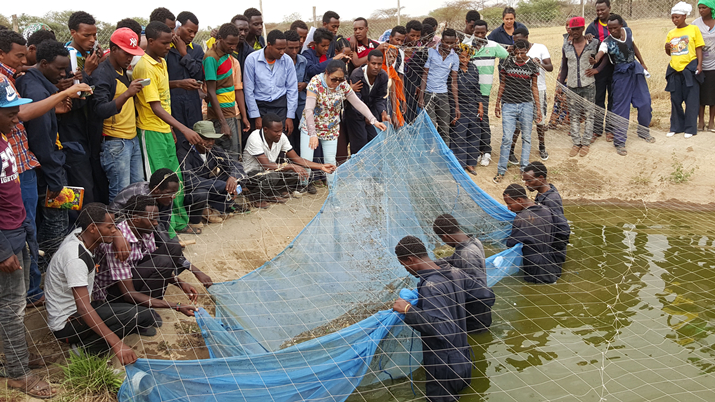|
|||||||||||
|
|
| Lessons in Livelihood |
| Chinese teachers share expertise and technical knowhow to give a leg-up to aspiring Ethiopian farmers |
| By Liu Jian | VOL. 8 April 2016 |
 |
|
He Wang demonstrates fishing techniques to students (COURTESY PHOTO) |
It was the first fish pond at the Alage Agricultural Technical Vocational Education and Training (ATVET) College in Ethiopia, south of capital Addis Ababa, where the 52-year-old has been working since 2013. The chief designer and coordinator of the fish pond project, she solved the problems that had cropped up during the work with so much ingenuity that it won her the nickname "iron lady" from her admiring co-workers.
There was no excavator. So the Chinese zoology expert sent to Ethiopia as part of the Sino-Ethiopian cooperation in ATVET, dug the ground manually with the laborers, taking four months to complete the task.
When there was shortage of labor, she persuaded the college’s construction workers and carpenters, students, and even the teachers in the zoology department to lend a hand, offering free breakfast.
When there was no budget to buy building materials, she came up with more innovations. They built the floor of the pond using soil instead of cement, mixing it with straw and covering the surface with a plastic sheet to prevent the water from oozing out.
"Thanks to the fish pond, teachers in the zoology department have improved their teaching," said Outo Kebeta, Dean of the college. "Students no longer have to travel over 50 km to do their internship in fish farming."
The pond was built in 2015. Now the college is planning to build more, both on the campus and in the countryside neighborhood.
Starting from scratch
The fish pond is just one of the many useful practical teaching tools built by Chinese teachers in Ethiopia. They have also set up dairy, sheep, bee and poultry farms, greenhouses and model agricultural plots to demonstrate practical technologies and introduce new varieties of crops.
Two more Chinese experts, Zhang Maoqing and Mei Jinbin, worked with local teachers and built an 8,000-square-meter teaching and demonstration site for the botany department at the college in 2013. At the site, they demonstrated the technology for higher production of wheat, corn, sorghum and beans.
"While helping ATVET colleges optimize their teaching system, we found local teachers are good at teaching theory but lack practical skills," said Li Ronggang, coordinator of the 16th session of the Chinese ATVET program in Ethiopia. The shortage of practical training is a big problem.
That is why Chinese experts built demonstration sites in the colleges they are deputed to, Li added.
To address this problem, in 2012, the Chinese Government funded the construction of the Ethio-China Agriculture Technology Demonstration Center in Ginchi, a small town southwest of Addis Ababa. The center is close to the Holeta ATVET College and serves its students. The center is also used to train teachers in the Alage and Agarfa ATVET Colleges.
Enhancing cooperation
Agriculture is the foundation of Ethiopia’s economy, accounting for?3 percent of its GDP, almost 80 percent of jobs and 90 percent of goods exports, according to the International Monetary Fund’s country report in November 2015. But farming, despite its long history, is still done in an old-fashioned way, resulting in low crop yield.
The farming condition in Ethiopia is similar to that in China before its reforms and opening up in the late 1970s, said Zhang, who has been teaching at the Alage ATVET College for 10 years. "We can use China’s advanced agricultural technologies to deal with the food insecurity here and eliminate poverty," she added.
Sino-Ethiopian cooperation in ATVET started in 2001. So far, 16 groups of Chinese experts from agricultural colleges, universities and research institutes have worked on the bilateral ATVET program. They have taught 56 courses in botany, zoology, natural resources, and veterinary sciences as well as sharing China’s experience in operating agricultural cooperatives. In 16 years, they have trained 2,100 local teachers, 1,300 agro-technicians and 39,000 students in 13 vocational colleges, Li said.
Chinese teachers have helped strengthen practical training in Ethiopia’s ATVET colleges and their support is multifaceted, said Gebremichael Meles, former ATVET coordinator at Ethiopia’s Ministry of Agriculture. "They show students how to operate machines and develop demonstration sites. Some of the instructors created new agricultural materials using local resources."
Compiling textbooks
One of the bottlenecks in the ATVET colleges is the shortage of good textbooks.
"There aren’t enough updated textbooks for students; most of the teaching materials in the ATVET colleges were compiled unprofessionally," Li said. "If high-quality textbooks are compiled, they will cover more Chinese technologies and put Ethiopia’s ATVET program on the fast track."
The Chinese teachers have been working with their local peers to compile textbooks for ATVET students. Already four have been compiled on small-scale irrigation, horticulture production, poultry production and animal disease prevention and control. Four more, covering cattle raising, bee keeping, crop production and soil and water conservation are expected to be completed by July.
The Chinese Government has also provided computers, projectors, tractors, incubators and laboratory equipment, improving teaching conditions and efficiency in Ethiopia's ATVET colleges.
Introducing new technologies
The Chinese teachers demonstrate and promote the agricultural technologies widely used in China. They have also come up with many innovations. They have built a user-friendly corn planting machine, Ethiopia’s first artificial insemination laboratory for breeding pigs, and even an expert diagnostic system for epidemics.
The teachers are also promoting agricultural technologies in rural areas. Supported by their colleges, they have established projects to demonstrate China’s greenhouse vegetable growing, micro-irrigation and fish farming technologies.
"Technologies for water-saving irrigation, fertilization, pest prevention and control, and processing agricultural products should be widely promoted," said Zhang. "These technologies can help intensive farming in Ethiopia."
|
||||||||||||
|
|||
| Copyright ChinAfrica All right reserved 京ICP备08005356号 |